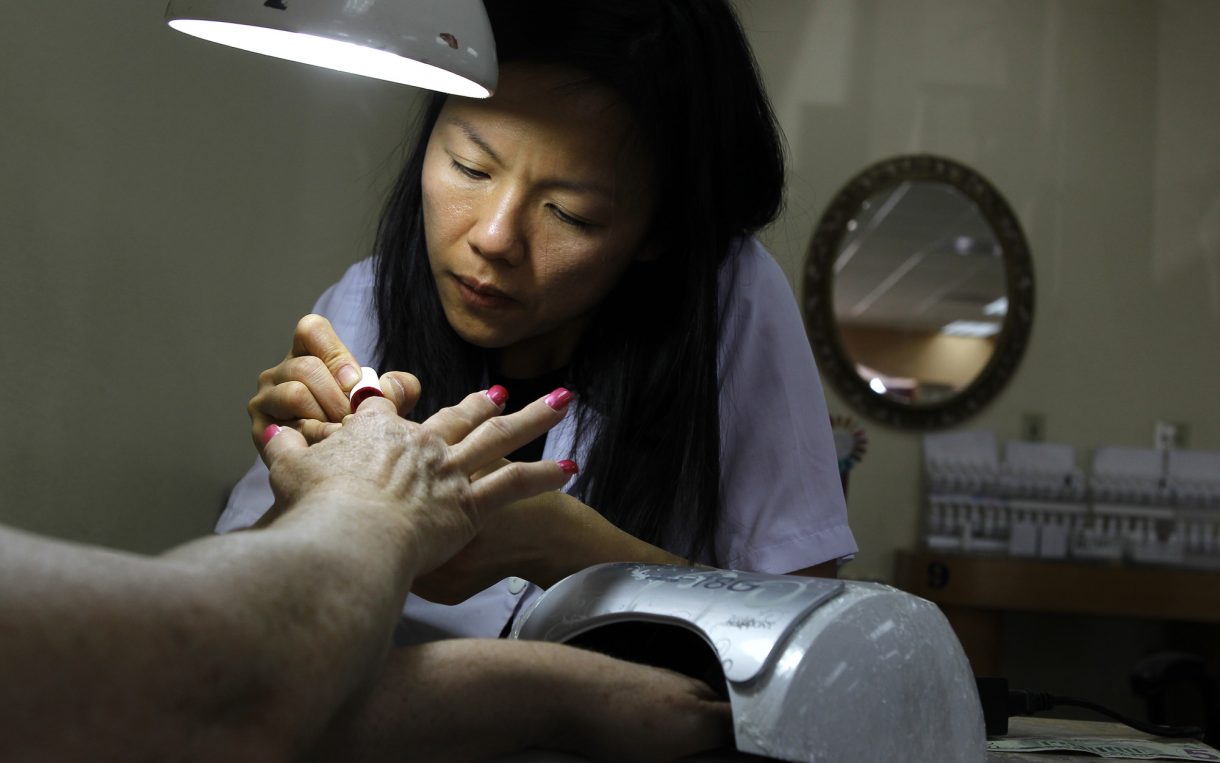Down with the partisan wage divide
 Thuy Vo polishes nails at Queen Nails. (Photo by Robert Gauthier/Los Angeles Times via Getty Images)
Thuy Vo polishes nails at Queen Nails. (Photo by Robert Gauthier/Los Angeles Times via Getty Images)
Even though red states feature the highest percentages of low-wage workers, the GOP is holding fast in opposing an increase in the federal minimum wage.
“When the minimum wage is too low, it is a drag on our businesses, our customers, our communities, and our economy.”
With that, businesswoman Kathy Eckhouse summed up the case for the Raise the Wage Act of 2019 on Capitol Hill last week. Like other speakers at the hearing—from economists to workers to local legislators—she explained that paying workers a fair, livable wage creates a productive workforce and boosts local economies.
It’s an overwhelmingly popular position. And the proof is everywhere: From polling results and voter initiatives to what employers and workers want, it’s clear the vast majority of Americans support lifting the federal minimum wage above $7.25 an hour. That goes for Iowans (like Eckhouse, who owns an artisan meat business) as well—two-thirds support a hike, and a new Oxfam report shows 35 percent of Iowans would benefit from the proposed raise to $15 an hour by 2024.
So does this mean Congress will raise the wage for the first time in 12 years? That will likely depend on the votes of Republican senators, an uphill battle that lays bare how GOP leaders at the state and federal level have opposed wage hikes while working to prevent local governments from lifting pay in their own communities.
A Nationwide Disconnect: GOP Resists the Public Interest
While the Raise the Wage Act should pass the Democratic-controlled House this year, it will likely be blocked by the Senate’s Republican majority.
Although support for a higher wage used to be somewhat bipartisan (Republicans would approve smaller wage increases, especially under a GOP president)—a partisan wage divide is deepening. As states and cities move to push up their minimum pay, House and Senate Republicans are standing in the way of their constituents’ overwhelming need and support for a raise to make sure all low-wage workers in the US benefit.
New research by Oxfam, with data from the Economic Policy Institute, shows that states with the biggest need for a raise are represented by Republicans who oppose this basic lift.
- In Mississippi, a startling 41.6 percent of workers would benefit from lifting the $7.25 minimum—the most of any state.
- In Arkansas, 39.2 percent of workers would gain by the raise.
- Idaho (38.1 percent), Louisiana (37.5 percent), and Kentucky (37.2 percent) are among states where workers would gain the most. But in all these states, Republican senators stand ready to block any progress in the minimum wage.
Nationwide, the partisan wage divide is even more dramatic.
- In the 22 states with two GOP senators, 36 percent of workers—20.5 million—would benefit from the increase to $15; that’s 52 percent of all US workers.
- In states with two Democrat senators, 16 percent—11 million—would benefit, accounting for just 28 percent of the national total. Put another way, states with two Republican senators have more than twice as many workers who would benefit from the raise than do states with Democratic senators.
In The People We Trust
These numbers reveal the disconnect between workers’ needs and the positions taken by many of their representatives in Washington—spawning action to raise wages at the state level.
In states long considered Republican territory, strong majorities of voters are backing minimum wage hikes. In 2017, 58 percent of Arizona voters approved a minimum raise, now at $11 an hour; and Colorado’s minimum rose to $11.10 an hour this year, but Republican Cory Gardner continues to oppose a federal increase.
In Maine, despite plenty of political opposition and no support from Republican Senator Susan Collins, voters approved an increase to $11 an hour this year, and $12 in 2020. Arkansas and Missouri have raised their minimum wages despite their Republican senators’ opposition.
Eventually this divide could start to influence the electoral prospects of representatives whose votes in the Senate lag far behind the views of their constituents.
It’s Time to Raise the Wage
Without a federal increase, millions of workers across the US will remain stuck at $7.25 an hour while their costs of living continue to soar. What workers are demanding is sensible and modest.
At the hearing, Terrence Wise, who works at McDonald’s in Independence, Missouri, explained the human reality: “I often imagine what $15 an hour would mean. It would mean I could put food on the table, we wouldn’t have to do homework in the dark, my daughters could have what they need for school supplies.”
The workers and voters, and many businesses of America, are ready to raise the wage. The question is, when will Republican leaders get the message and reflect the will of the people they are paid to represent?
TAKE ACTION WITH OXFAM TODAY: Tell the GOP to reward hard work and restore hope for millions of working families by signing this petition urging your Members of Congress to support the Raise the Wage Act of 2019.